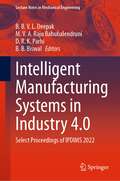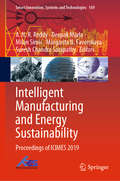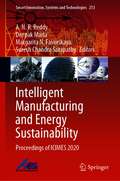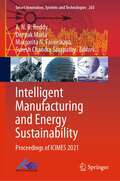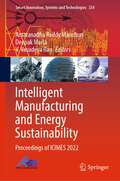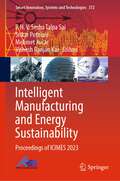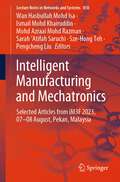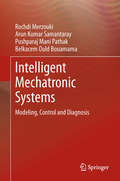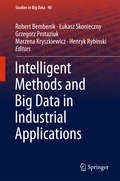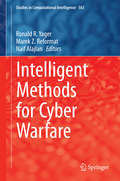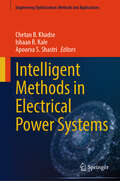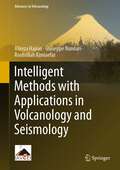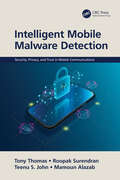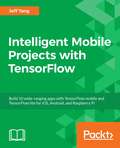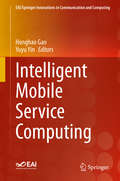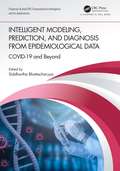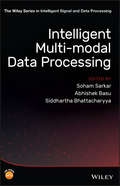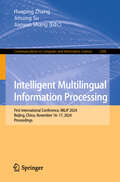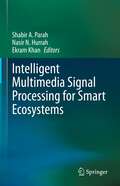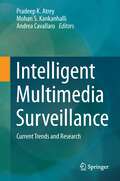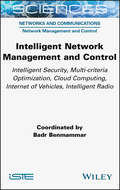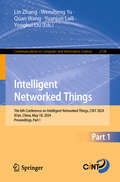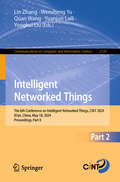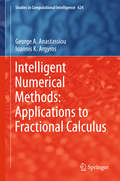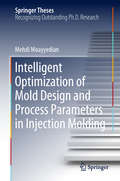- Table View
- List View
Intelligent Manufacturing Systems in Industry 4.0: Select Proceedings of IPDIMS 2022 (Lecture Notes in Mechanical Engineering)
by B. B. Biswal B. B. V. L. Deepak D. R. K. Parhi M. V. A. Raju BahubalendruniThis book presents the select proceedings of the 4th International Conference on Innovative Product Design and Intelligent Manufacturing System (IPDIMS 2022). It covers the latest trends in the areas of design and manufacturing. The main topics covered include Industry 4.0, smart manufacturing, advanced robotics, and CAD/CAM/CIM. The contents of this book are useful for researchers and professionals working in the disciplines of mechatronics, mechanical, manufacturing, production, and industrial engineering.
Intelligent Manufacturing and Energy Sustainability: Proceedings of ICIMES 2019 (Smart Innovation, Systems and Technologies #169)
by Margarita N. Favorskaya Suresh Chandra Satapathy A. N. R. Reddy Deepak Marla Milan SimicThis book includes selected, high-quality papers presented at the International Conference on Intelligent Manufacturing and Energy Sustainability (ICIMES 2019) held at the Department of Mechanical Engineering, Malla Reddy College of Engineering & Technology (MRCET), Maisammaguda, Hyderabad, India, from 21 to 22 June 2019. It covers topics in the areas of automation, manufacturing technology and energy sustainability.
Intelligent Manufacturing and Energy Sustainability: Proceedings of ICIMES 2020 (Smart Innovation, Systems and Technologies #213)
by Margarita N. Favorskaya Suresh Chandra Satapathy A. N. R. Reddy Deepak MarlaThis book includes best selected, high-quality research papers presented at the International Conference on Intelligent Manufacturing and Energy Sustainability (ICIMES 2020) held at the Department of Mechanical Engineering, Malla Reddy College of Engineering & Technology (MRCET), Maisammaguda, Hyderabad, India, during August 21-22, 2020. It covers topics in the areas of automation, manufacturing technology and energy sustainability and also includes original works in the intelligent systems, manufacturing, mechanical, electrical, aeronautical, materials, automobile, bioenergy and energy sustainability.
Intelligent Manufacturing and Energy Sustainability: Proceedings of ICIMES 2021 (Smart Innovation, Systems and Technologies #265)
by Margarita N. Favorskaya Suresh Chandra Satapathy A. N. R. Reddy Deepak MarlaThis book includes best selected, high-quality research papers presented at the International Conference on Intelligent Manufacturing and Energy Sustainability (ICIMES 2021) held at the Department of Mechanical Engineering, Malla Reddy College of Engineering & Technology (MRCET), Maisammaguda, Hyderabad, India, during June 18-19, 2021. It covers topics in the areas of automation, manufacturing technology and energy sustainability and also includes original works in the intelligent systems, manufacturing, mechanical, electrical, aeronautical, materials, automobile, bioenergy and energy sustainability.
Intelligent Manufacturing and Energy Sustainability: Proceedings of ICIMES 2022 (Smart Innovation, Systems and Technologies #334)
by Deepak Marla Amaranadha Reddy Manchuri V. Vasudeva RaoThis book includes best selected, high-quality research papers presented at the International Conference on Intelligent Manufacturing and Energy Sustainability (ICIMES 2022) held at the Department of Mechanical Engineering, Malla Reddy College of Engineering & Technology (MRCET), Maisammaguda, Hyderabad, India, during June 24–25, 2022. It covers topics in the areas of automation, manufacturing technology, and energy sustainability and also includes original works in the intelligent systems, manufacturing, mechanical, electrical, aeronautical, materials, automobile, bioenergy, and energy sustainability.
Intelligent Manufacturing and Energy Sustainability: Proceedings of ICIMES 2023 (Smart Innovation, Systems and Technologies #372)
by Vishesh Ranjan Kar P. H. V. Sesha Talpa Sai Srikar Potnuru Mehmet AvcarThis book includes best selected, high-quality research papers presented at the International Conference on Intelligent Manufacturing and Energy Sustainability (ICIMES 2023) held at the Department of Mechanical Engineering, Malla Reddy College of Engineering & Technology (MRCET), Hyderabad, India, during June 23–24, 2023. It covers topics in the areas of automation, manufacturing technology, and energy sustainability and also includes original works in the intelligent systems, manufacturing, mechanical, electrical, aeronautical, materials, automobile, bioenergy, and energy sustainability.
Intelligent Manufacturing and Mechatronics: Selected Articles from iM3F 2023, 07–08 August, Pekan, Malaysia (Lecture Notes in Networks and Systems #850)
by Mohd Azraai Mohd Razman Ismail Mohd Khairuddin Pengcheng Liu Wan Hasbullah Mohd Isa Sarah 'Atifah Saruchi Sze-Hong TehThis book presents parts of the iM3F 2023 proceedings from the mechatronics as well as the intelligent manufacturing tracks. It highlights recent trends and key challenges in mechatronics as well as the advent of intelligent manufacturing engineering and technology that are non-trivial in embracing Industry 4.0 as well as addressing the UN Sustainable Development Goals. The book deliberates on conventional as well as advanced solutions that are utilized in the variety of mechatronics and intelligent manufacturing-based applications. The readers are envisaged to gain an insightful view on the current trends, issues, mitigating factors as well as solutions from this book. It provides a platform that allows academics as well as other relevant stakeholders to share, discuss, and deliberate their latest research findings in the field of manufacturing, mechatronics, and materials, respectively.
Intelligent Mechatronic Systems
by Rochdi Merzouki Pushparaj Mani Pathak Arun Kumar Samantaray Belkacem Ould BouamamaActing as a support resource for practitioners and professionals looking to advance their understanding of complex mechatronic systems, Intelligent Mechatronic Systems explains their design and recent developments from first principles to practical applications. Detailed descriptions of the mathematical models of complex mechatronic systems, developed from fundamental physical relationships, are built on to develop innovative solutions with particular emphasis on physical model-based control strategies. Following a concurrent engineering approach, supported by industrial case studies, and drawing on the practical experience of the authors, Intelligent Mechatronic Systems covers range of topic and includes: An explanation of a common graphical tool for integrated design and its uses from modeling and simulation to the control synthesis Introductions to key concepts such as different means of achieving fault tolerance, robust overwhelming control and force and impedance control Dedicated chapters for advanced topics such as multibody dynamics and micro-electromechanical systems, vehicle mechatronic systems, robot kinematics and dynamics, space robotics and intelligent transportation systems Detailed discussion of cooperative environments and reconfigurable systems Intelligent Mechatronic Systems provides control, electrical and mechanical engineers and researchers in industrial automation with a means to design practical, functional and safe intelligent systems.
Intelligent Methods and Big Data in Industrial Applications (Studies in Big Data #40)
by Marzena Kryszkiewicz Robert Bembenik Łukasz Skonieczny Henryk Rybinski Grzegorz ProtaziukThe inspiration for this book came from the Industrial Session of the ISMIS 2017 Conference in Warsaw. It covers numerous applications of intelligent technologies in various branches of the industry. Intelligent computational methods and big data foster innovation and enable the industry to overcome technological limitations and explore the new frontiers. Therefore it is necessary for scientists and practitioners to cooperate and inspire each other, and use the latest research findings to create new designs and products. As such, the contributions cover solutions to the problems experienced by practitioners in the areas of artificial intelligence, complex systems, data mining, medical applications and bioinformatics, as well as multimedia- and text processing. Further, the book shows new directions for cooperation between science and industry and facilitates efficient transfer of knowledge in the area of intelligent information systems.
Intelligent Methods for Cyber Warfare
by Ronald R. Yager Marek Z. Reformat Naif AlajlanCyberwarfare has become an important concern for governmental agencies as well businesses of various types. This timely volume, with contributions from some of the internationally recognized, leaders in the field, gives readers a glimpse of the new and emerging ways that Computational Intelligence and Machine Learning methods can be applied to address problems related to cyberwarfare. The book includes a number of chapters that can be conceptually divided into three topics: chapters describing different data analysis methodologies with their applications to cyberwarfare, chapters presenting a number of intrusion detection approaches, and chapters dedicated to analysis of possible cyber attacks and their impact. The book provides the readers with a variety of methods and techniques, based on computational intelligence, which can be applied to the broad domain of cyberwarfare.
Intelligent Methods in Electrical Power Systems (Engineering Optimization: Methods and Applications)
by Ishaan R. Kale Apoorva S. Shastri Chetan B. KhadseThis book provides a comprehensive review of the latest developments in optimization based learning algorithms within the field of electrical engineering. It covers various power system applications including efficient power system operation, load forecasting, fault analysis, home automation and efficient smart grid management. Each application is accompanied by case studies and a literature review in self-contained chapters. The book is dedicated to study the effectiveness of intelligent methods in addressing the power system problems and its mitigation using optimization algorithms. It discusses several optimization algorithms such as random forest algorithm, metaheuristic algorithm, scaled conjugate gradient descent algorithm, artificial bee colony algorithm etc. and their usability in intelligent decision makers for the various optimization problems in electrical engineering. This timely book serves as a practical guide and reference sources for students, researchers and professionals.
Intelligent Methods with Applications in Volcanology and Seismology (Advances in Volcanology)
by Giuseppe Nunnari Alireza Hajian Roohollah KimiaefarThis book presents intelligent methods like neural, neuro-fuzzy, machine learning, deep learning and metaheuristic methods and their applications in both volcanology and seismology. The complex system of volcanoes and also earthquakes is a big challenge to identify their behavior using available models, which motivates scientists to apply non-model based methods. As there are lots of seismology and volcanology data sets, i.e., the local and global networks, one solution is using intelligent methods in which data-based algorithms are used.
Intelligent Mobile Malware Detection (Security, Privacy, and Trust in Mobile Communications)
by Tony Thomas Mamoun Alazab Roopak Surendran Teenu S. JohnThe popularity of Android mobile phones has caused more cybercriminals to create malware applications that carry out various malicious activities. The attacks, which escalated after the COVID-19 pandemic, proved there is great importance in protecting Android mobile devices from malware attacks. Intelligent Mobile Malware Detection will teach users how to develop intelligent Android malware detection mechanisms by using various graph and stochastic models. The book begins with an introduction to the Android operating system accompanied by the limitations of the state-of-the-art static malware detection mechanisms as well as a detailed presentation of a hybrid malware detection mechanism. The text then presents four different system call-based dynamic Android malware detection mechanisms using graph centrality measures, graph signal processing and graph convolutional networks. Further, the text shows how most of the Android malware can be detected by checking the presence of a unique subsequence of system calls in its system call sequence. All the malware detection mechanisms presented in the book are based on the authors' recent research. The experiments are conducted with the latest Android malware samples, and the malware samples are collected from public repositories. The source codes are also provided for easy implementation of the mechanisms. This book will be highly useful to Android malware researchers, developers, students and cyber security professionals to explore and build defense mechanisms against the ever-evolving Android malware.
Intelligent Mobile Projects with TensorFlow: Build 10+ Artificial Intelligence apps using TensorFlow Mobile and Lite for iOS, Android, and Raspberry Pi
by Xiaofei Jeff" TangCreate Deep Learning and Reinforcement Learning apps for multiple platforms with TensorFlowKey FeaturesBuild TensorFlow-powered AI applications for mobile and embedded devices Learn modern AI topics such as computer vision, NLP, and deep reinforcement learningGet practical insights and exclusive working code not available in the TensorFlow documentationBook DescriptionAs a developer, you always need to keep an eye out and be ready for what will be trending soon, while also focusing on what's trending currently. So, what's better than learning about the integration of the best of both worlds, the present and the future? Artificial Intelligence (AI) is widely regarded as the next big thing after mobile, and Google's TensorFlow is the leading open source machine learning framework, the hottest branch of AI. This book covers more than 10 complete iOS, Android, and Raspberry Pi apps powered by TensorFlow and built from scratch, running all kinds of cool TensorFlow models offline on-device: from computer vision, speech and language processing to generative adversarial networks and AlphaZero-like deep reinforcement learning. You’ll learn how to use or retrain existing TensorFlow models, build your own models, and develop intelligent mobile apps running those TensorFlow models. You'll learn how to quickly build such apps with step-by-step tutorials and how to avoid many pitfalls in the process with lots of hard-earned troubleshooting tips.What you will learn Classify images with transfer learning Detect objects and their locations Transform pictures with amazing art styles Understand simple speech commands Describe images in natural language Recognize drawing with Convolutional Neural Network and Long Short-Term Memory Predict stock price with Recurrent Neural Network in TensorFlow and Keras Generate and enhance images with generative adversarial networks Build AlphaZero-like mobile game app in TensorFlow and Keras Use TensorFlow Lite and Core ML on mobile Develop TensorFlow apps on Raspberry Pi that can move, see, listen, speak, and learnWho this book is forIf you're an iOS/Android developer interested in building and retraining others' TensorFlow models and running them in your mobile apps, or if you're a TensorFlow developer and want to run your new and amazing TensorFlow models on mobile devices, this book is for you. You'll also benefit from this book if you're interested in TensorFlow Lite, Core ML, or TensorFlow on Raspberry Pi.
Intelligent Mobile Service Computing (EAI/Springer Innovations in Communication and Computing)
by Honghao Gao Yuyu YinThis book discusses recent research and applications in intelligent service computing in mobile environments. The authors first explain how advances in artificial intelligence and big data have allowed for an array of intelligent services with complex and diverse applications. They then show how this brings new opportunities and challenges for service computing. The book, made up of contributions from academic and industry, aims to present advances in intelligent services, new algorithms and techniques in the field, foundational theory and systems, as well as practical real-life applications. Some of the topics discussed include cognition, modeling, description and verification for intelligent services; discovery, recommendation and selection for intelligent services; formal verification, testing and inspection for intelligent services; and composition and cooperation methods for intelligent services.
Intelligent Modeling, Prediction, and Diagnosis from Epidemiological Data: COVID-19 and Beyond (Chapman & Hall/CRC Computational Intelligence and Its Applications)
by Siddhartha BhattacharyyaIntelligent Modeling, Prediction, and Diagnosis from Epidemiological Data: COVID-19 and Beyond is a handy treatise to elicit and elaborate possible intelligent mechanisms for modeling, prediction, diagnosis, and early detection of diseases arising from outbreaks of different epidemics with special reference to COVID-19. Starting with a formal introduction of the human immune systems, this book focuses on the epidemiological aspects with due cognizance to modeling, prevention, and diagnosis of epidemics. In addition, it also deals with evolving decisions on post-pandemic socio-economic structure. The book offers a comprehensive coverage of the most essential topics, including: A general overview of pandemics and their outbreak behavior A detailed overview of CI techniques Intelligent modeling, prediction, and diagnostic measures for pandemics Prognostic models Post-pandemic socio-economic structure The accompanying case studies are based on available real-world data sets. While other books may deal with this COVID-19 pandemic, none features topics covering the human immune system as well as influences on the environmental disorder due to the ongoing pandemic. The book is primarily intended to benefit medical professionals and healthcare workers as well as the virologists who are essentially the frontline fighters of this pandemic. In addition, it also serves as a vital resource for relevant researchers in this interdisciplinary field as well as for tutors and postgraduate and undergraduate students of information sciences.
Intelligent Multi-Modal Data Processing (The Wiley Series in Intelligent Signal and Data Processing)
by Siddhartha Bhattacharyya Abhishek Basu Soham SarkarA comprehensive review of the most recent applications of intelligent multi-modal data processing Intelligent Multi-Modal Data Processing contains a review of the most recent applications of data processing. The Editors and contributors – noted experts on the topic – offer a review of the new and challenging areas of multimedia data processing as well as state-of-the-art algorithms to solve the problems in an intelligent manner. The text provides a clear understanding of the real-life implementation of different statistical theories and explains how to implement various statistical theories. Intelligent Multi-Modal Data Processing is an authoritative guide for developing innovative research ideas for interdisciplinary research practices. Designed as a practical resource, the book contains tables to compare statistical analysis results of a novel technique to that of the state-of-the-art techniques and illustrations in the form of algorithms to establish a pre-processing and/or post-processing technique for model building. The book also contains images that show the efficiency of the algorithm on standard data set. This important book: Includes an in-depth analysis of the state-of-the-art applications of signal and data processing Contains contributions from noted experts in the field Offers information on hybrid differential evolution for optimal multilevel image thresholding Presents a fuzzy decision based multi-objective evolutionary method for video summarisation Written for students of technology and management, computer scientists and professionals in information technology, Intelligent Multi-Modal Data Processing brings together in one volume the range of multi-modal data processing.
Intelligent Multilingual Information Processing: First International Conference, IMLIP 2024, Beijing, China, November 16–17, 2024, Proceedings (Communications in Computer and Information Science #2395)
by Jinsong Su Huaping Zhang Jianyun ShangThis CCIS post conference volume constitutes the proceedings of the First International Conference on Intelligent Multilingual Information Processing, IMLIP 2024, in Beijing, China, during November 2024. The 30 full papers presented at IMLIP 2024 were carefully reviewed and selected from 144 submissions. The papers contained in these proceedings address challenging issues in Cross-lingual processing, Large language models, Computational linguistics theory, Resource and corpus construction, Evaluation, Multilingual language understanding, Machine translation, as well as the fundamentals and applications of Multimodal intelligent information processing.
Intelligent Multimedia Signal Processing for Smart Ecosystems
by Shabir A. Parah Nasir N. Hurrah Ekram KhanA smart ecosystem is envisioned to exchange and analyze data across systems, enabling a flexible, faster, and reliable smart ecosystem for high-quality results at reduced costs and little human intervention. This book introduces many innovative approaches and provides solutions to various problems of smart ecosystems designed by employing various techniques/models based on AI, ML, Deep Learning, and the Internet of Things (IoT). The main focus is on intelligent multimedia processing and automated decision-making for various services, real-time data analysis, data security, cost-effective solutions for multimedia applications, smart information processing systems, and smart city planning to name a few. In addition, this book presents some key insights and future directions in the various areas of technology. Throughout the book, many state-of-the-art solutions concerning various applications are proposed to solve the issues and ensure the quality of services (QoS). The authors discuss the limitations of the current techniques used to design a smart ecosystem and highlight some prospective areas of research in the future. The book comprehensively discusses multimedia processing of various forms of data comprising text, images, and audio for the implementation of various solutions. The book is aimed to open many areas of research and thus would present a comprehensive reference for the design of smart ecosystems in various applications.
Intelligent Multimedia Surveillance
by Andrea Cavallaro Pradeep K. Atrey Mohan S. KankanhalliIntelligent multimedia surveillance concerns the analysis of multiple sensing inputs including video and audio streams, radio-frequency identification (RFID), and depth data. These data are processed for the automated detection and tracking of people, vehicles, and other objects. The goal is to locate moving targets, to understand their behavior, and to detect suspicious or abnormal activities for crime prevention. Despite its benefits, there is societal apprehension regarding the use of such technology, so an important challenge in this research area is to balance public safety and privacy. This edited book presents recent findings in the field of intelligent multimedia surveillance emerging from disciplines such as multimedia computing, computer vision, and artificial intelligence. It consists of nine chapters addressing intelligent video surveillance, video analysis of crowds, privacy issues in intelligent multimedia surveillance, RFID technology for localization of objects, object tracking using visual saliency information, estimating multiresolution depth using active stereo vision, and performance evaluation for video surveillance systems. The book will be of value to researchers and practitioners working on related problems in security, multimedia, and artificial intelligence.
Intelligent Network Management and Control: Intelligent Security, Multi-criteria Optimization, Cloud Computing, Internet of Vehicles, Intelligent Radio
by Badr BenmammarThe management and control of networks can no longer be envisaged without the introduction of artificial intelligence at all stages. Intelligent Network Management and Control deals with topical issues related mainly to intelligent security of computer networks, deployment of security services in SDN (software-defined networking), optimization of networks using artificial intelligence techniques and multi-criteria optimization methods for selecting networks in a heterogeneous environment. This book also focuses on selecting cloud computing services, intelligent unloading of calculations in the context of mobile cloud computing, intelligent resource management in a smart grid-cloud system for better energy efficiency, new architectures for the Internet of Vehicles (IoV), the application of artificial intelligence in cognitive radio networks and intelligent radio input to meet the on-road communication needs of autonomous vehicles.
Intelligent Networked Things: The 6th Conference on Intelligent Networked Things, CINT 2024, Xi'an, China, May 18, 2024, Proceedings, Part I (Communications in Computer and Information Science #2138)
by Lin Zhang Quan Wang Yuanjun Laili Wensheng Yu Yongkui LiuThis book constitutes the refereed proceedings of the The 6th Conference on Intelligent Networked Things on Intelligent Networked Things, CINT 2024, held in Xi'an, China, in May 18, 2024. The 51 full papers presented were carefully reviewed and selected from 151 submissions. The conference papers are organized in topical sections on: Part I - Theories and Mathematical Methods for Intelligent Networked Things; Modeling and Simulation in Intelligent Networked Things. Part II - Artificial Intelligence for Intelligent Networked Things; Optimization and Decision in Intelligent Networked Things.
Intelligent Networked Things: The 6th Conference on Intelligent Networked Things, CINT 2024, Xi'an, China, May 18, 2024, Proceedings, Part II (Communications in Computer and Information Science #2139)
by Lin Zhang Quan Wang Yuanjun Laili Wensheng Yu Yongkui LiuThis book constitutes the refereed proceedings of the The 6th Conference on Intelligent Networked Things on Intelligent Networked Things, CINT 2024, held in Xi'an, China, in May 18, 2024. The 51 full papers presented were carefully reviewed and selected from 151 submissions. The conference papers are organized in topical sections on: Part I - Theories and Mathematical Methods for Intelligent Networked Things; Modeling and Simulation in Intelligent Networked Things. Part II - Artificial Intelligence for Intelligent Networked Things; Optimization and Decision in Intelligent Networked Things.
Intelligent Numerical Methods: Applications to Fractional Calculus
by George A. Anastassiou Ioannis K. ArgyrosIn this monograph the authors present Newton-type, Newton-like and other numerical methods, which involve fractional derivatives and fractional integral operators, for the first time studied in the literature. All for the purpose to solve numerically equations whose associated functions can be also non-differentiable in the ordinary sense. That is among others extending the classical Newton method theory which requires usual differentiability of function. Chapters are self-contained and can be read independently and several advanced courses can be taught out of this book. An extensive list of references is given per chapter. The book's results are expected to find applications in many areas of applied mathematics, stochastics, computer science and engineering. As such this monograph is suitable for researchers, graduate students, and seminars of the above subjects, also to be in all science and engineering libraries.
Intelligent Optimization of Mold Design and Process Parameters in Injection Molding (Springer Theses)
by Mehdi MoayyedianThis book describes an effective framework for setting the right process parameters and new mold design to reduce the current plastic defects in injection molding. It presents a new approach for the optimization of injection molding process via (i) a new mold runner design which leads to 20 percent reduction in scrap rate, 2.5 percent reduction in manufacturing time, and easier ejection of injected part, (ii) a new mold gate design which leads to less plastic defects; and (iii) the introduction of a number of promising alternatives with high moldability indices. Besides presenting important developments of relevance academic research, the book also includes useful information for people working in the injection molding industry, especially in the green manufacturing field.
